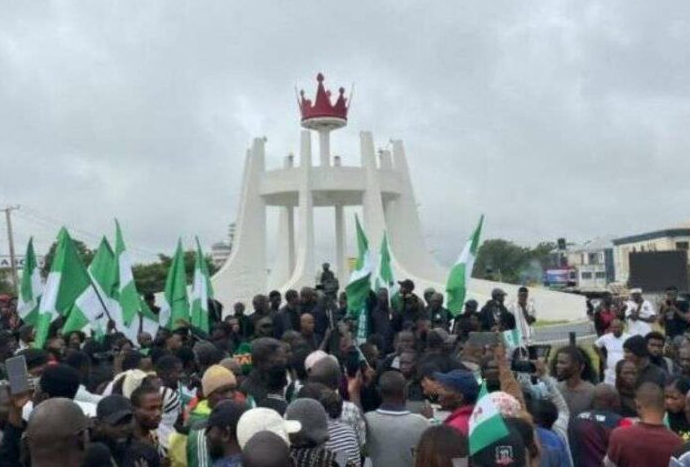Security agencies in Nigeria have increased their presence in key cities such as Abuja, Lagos, and Port Harcourt in anticipation of nationwide protests scheduled for October 1, coinciding with the country’s Independence Day celebrations.
The move comes as several youth groups remain adamant about going ahead with demonstrations despite warnings from government authorities.
Organizers of the protest, primarily made up of young Nigerians, are calling attention to issues such as unemployment, police brutality, and bad governance.
The protests, initially gaining momentum on social media under the hashtag #EndSARS, have evolved into a broader movement, focusing on socio-economic challenges and political reforms.
In response, security forces have deployed heavily armed personnel at strategic locations across major cities. The Nigerian Police Force (NPF) has set up roadblocks and security checkpoints on key highways, while mobile police units and surveillance teams have been activated to monitor the situation.
In Lagos, aerial surveillance has been observed, with drones and helicopters patrolling certain areas as a preventive measure
In the nation’s capital, Abuja, military vehicles were spotted patrolling government buildings and embassies, while the police have tightened security around critical infrastructure, including the Presidential Villa and National Assembly.
“We are not against peaceful protests, but we will not tolerate any form of violence or activities that threaten public safety,” said Femi Adesina, a presidential spokesperson. He urged the protesters to reconsider their plans, noting that the nation is still grappling with security challenges, including insurgencies in the northern regions.
READ ALSO: October 1st: Nationwide protest looms, as organizers list demands
Despite the heightened security measures, youth leaders have reiterated their determination to proceed with the protests. Organizers have promised that the protests will remain peaceful, emphasizing their constitutional right to assemble and voice their concerns.
“The government has been ignoring us for too long. The youth are suffering, and we cannot stay silent any longer,” said Adeola Ogundipe, a representative from one of the protest groups. “We want better jobs, we want accountability, and we want an end to the corruption that is robbing us of our future.”
Many young Nigerians have expressed frustration over what they perceive as slow progress on reforms following the #EndSARS protests in 2020, which led to the disbanding of the Special Anti-Robbery Squad (SARS) but, according to critics, have not resulted in meaningful changes in police practices or economic improvement.
The federal government has urged dialogue instead of protests, with the Minister of Information and Culture, Lai Mohammed, issuing a statement calling on the youth to channel their grievances through established mechanisms. “We understand the concerns raised, and the government is committed to addressing them. However, public protests at this time could worsen the security situation in the country,” he warned.
READ ALSO: Just in: Nigeria’s inflation rate hits 21.09% for October
Civil society organizations have also called for calm, stressing that while the right to protest is fundamental, the current security environment makes it necessary for all parties to exercise caution.
As tensions rise, international human rights organizations, including Amnesty International, have closely monitored the situation. They have called on Nigerian authorities to respect the right to peaceful assembly while urging both sides to avoid any form of violence.
With just a day to go before October 1, the unfolding scenario in Nigeria has drawn comparisons to the 2020 #EndSARS protests, and many are concerned about the potential for escalation. All eyes are on how both the government and youth activists will navigate this delicate moment.
The protests are set to be a defining test for Nigeria’s democracy and its handling of dissent, with the outcome likely to have far-reaching implications for the nation’s political and social landscape.

 Entertainment5 days ago
Entertainment5 days ago
 Health1 week ago
Health1 week ago
 Health4 days ago
Health4 days ago
 Football1 week ago
Football1 week ago
 Football1 week ago
Football1 week ago
 Crime4 days ago
Crime4 days ago
 Education6 days ago
Education6 days ago
 Crime1 week ago
Crime1 week ago

